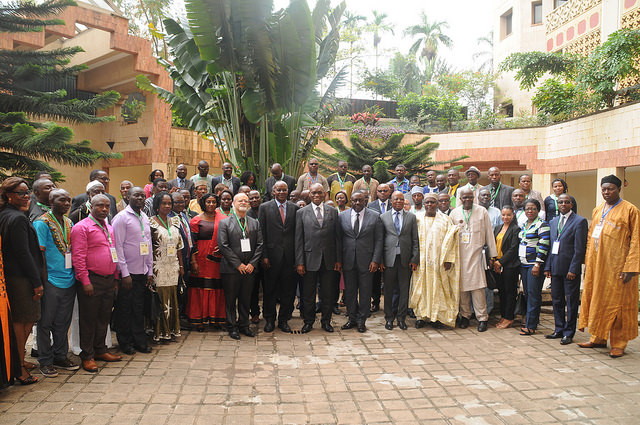
By PAMACC News
A high-level meeting on controlling Fall armyworm in west and central Africa began today in Yaoundé, Cameroon.
In attendance at this meeting organised by the African Development Bank (AfDB) in collaboration with the International Institute for Tropical Agriculture (IITA) and Technologies for African Agricultural Transformation (TAAT) are ministers of agriculture from the sub-regions, focal points from the respective Agriculture ministries in the two sub-regions, scientists and experts from different organisations.
Hon Eyebe Ayissi, Cameroonian minister for agriculture, in his remarks while declaring the meeting open welcomed the sub-regional approach to tackling the fall armyworm menace whose invasion according to him, is a threat to the resilience of cereal cropping systems in Africa.
“Sustainable management of this pest needs a multi-stakeholder approach with the cereal growers in the middle of such an approach. While efforts to build the natural regulatory factors of the pest (biological control, building resistance among host plants etc.) are undertaken, farmers need advice, tools, resources, risk management options and a conducive environment to sustainably manage Fall armyworm,” Hon Ayissi added.
In a similar vein, Gaston Cossi Dossouhoui, the Beninese minister for agriculture, livestock and fishery commended the organisers for the initiative which he described as timely.
“In Benin, more than 33,000 hectares have been reportedly destroyed by Fall Armyworms which amounts to 44,500 tons of production lost, about 3.4% of the forecast national production for 2016-17,” Hon Dossouhoi said.
The Deputy Director General, Partnerships for Development at IITA, Dr Kenton Dashiel in his remarks called for an integrated approach against the rampaging insect in Africa. He stressed the need for a coherent policy framework and a combination of chemical and biological control measures in the aggregated efforts against the caterpillar.
Also present at the meeting were representatives of the Food and Agriculture Organisation (FAO), International Institute for Tropical Agriculture (IITA), African Development Bank (AfDB), Syngenta, and DVA Agro.
The impact of Fall armywormin Africa
Fall Armyworm (FAW), or Spodoptera frugiperda, is an insect that is native to tropical and subtropical regions of the Americas. In its larva stage, it can cause significant damage to crops, if not well managed.
It prefers maize but can feed on more than 80 additional species of plants including rice, sorghum, millet, sugarcane, vegetable crops and cotton.
Fall Armyworm was first detected in Central and Western Africa in early 2016 and since then has been reported and confirmed in all of mainland Southern Africa (except Lesotho), Madagascar, and Seychelles (Island State).
To-date, Fall Armyworm has been detected and reported in almost all of Sub-Saharan Africa, except in Djibouti, Eritrea, and Lesotho.
In Southern Africa, the outbreak of the pest in the 2016-2017 crop season came at a time when households in the region were still reeling from the impact of the El Nino induced drought in 2015-2016, which affected an estimated 40 million people.
Fall Armyworm is a dangerous transboundary pest with a high potential to continually spread due to its natural migratory capacity and trade.
Fall Armyworm has a wide host range of over 80 plants, with high preference for cereal crops such as maize, sorghum and other crops such as sugarcane including wild grasses.
Apart from the danger to human food security, Fall Armyworm has been shown to causes losses in livestock.
Speculations as to the causes of death include high cyanide levels caused by armyworm damage in some types of grasses, and ingestion of caterpillars or fungal mycotoxins on armyworm faeces.











